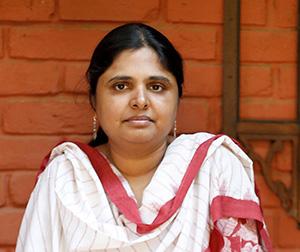'The response from the government using words like malicious, deliberate, etc is diverting from the real issue.'
'The indicators related to young children such as stunting or child mortality are a reflection of the social development in the country.'
'That's how we have to look at it and not ignore the issue by denying the data.'

An international study published in Lancet Discovery Science a year ago has suddenly became a hot topic of discussion in India.
The study was conducted using the health surveys across 92 low-income and middle-income countries at various times between 1993 and 2021.
The study says India has the highest rate of 'Zero-Food' children after Guinea and Mali at 19.3% while the figures for the so-called poorer countries like Bangladesh and Pakistan are 5.6% and 9.1%.
'Zero-Food' children is described as those who have not consumed any food in a 24 hour span.
Though the study used data from the Union health ministry's National Family Health Survey (NFHS), the ministry condemned it as 'malicious and a deliberate attempt to sensationalise fake news'.
What does the study actually expose?
"While we might squabble about whether the term zero-food is the most appropriate for what was being measured, it does not take away from the fact that there are massive deficits in India in infant and young child feeding, and compared to other countries which are even poorer, we perform poorly," Dr Dipa Sinha, assistant professor of economics at the School of Liberal Studies, Dr B R Ambedkar University, Delhi, tells Rediff.com's Shobha Warrier.
The study based on the data from five National Family Health Surveys conducted in 2019-2021 says that 19.3% of India's infants and small children suffer from zero-food. How shocking is this revelation?
It is concerning that India ranks so poorly on this indicator, but it not entirely unexpected for those who track malnutrition in the country. But we need to interpret the zero-food indicator correctly.
The study has included infants who may have been breastfed, but have not got any other feeding in the previous 24 hours, and no complementary feeding.
The appropriate age for initiation of complementary feeding is at 6 months, and there is a delay in initiation for many children in India. So, a significant proportion of the 19.3% zero food children probably belong to the smaller age group of 6 months to 9 months, who are facing delayed initiation of complementary feeding.
This is also a serious problem and needs to be recognised.
Appropriate infant and young child feeding practices include exclusive breastfeeding, starting complementary feeding at the appropriate time, complementary feeding of adequate number of times and with diverse foods as well as continued breastfeeding.
The fact that very few children meet all these is an issue of concern and can have long term implications for malnutrition and health.
This is the even more shocking figure in fact from NFHS-5 data, that only 11% of children of this age group of 6 to 23 months meet what is called the 'minimum acceptable diet' by WHO.
The health ministry said it was a malicious and deliberate attempt to sensationalise fake news...
I really think the response from the government using words like malicious, deliberate, etc is diverting from the real issue. There is nothing malicious in this, the study is quite transparent about the methodology and the definitions used.
And they have used comparable data and definitions for all countries included in the study.
And the Demographic and Health Surveys (DHS) have similar questionnaires for all the countries and the NFHS in India led by the ministry of health, which is part of these DHS surveys.
The study shows the poor ranking of India among all the countries on the indicator that they have examined.
While we might squabble about whether the term zero-food is the most appropriate for what was being measured, it does not take away from the fact that there are massive deficits in India in infant and young child feeding, and compared to other countries which are even poorer, we perform poorly.
The ministry had a similar response when the Global Hunger Index came out. There also, when you look at it technically, what the global hunger index is measuring is not just hunger but malnutrition and mortality too.
So it becomes a question of semantics, after a point. The name 'zero-food' if it is literally interpreted to mean the child has not been fed anything. But it is not just that as it includes children who may have been breastfed.
Whatever it is, these indicators are valuable indicators, and we shouldn't be doing badly in it.
In the global hunger index, India ranked 111 out of 125 countries. In the number of zero-food children also, India is the third highest at 19.3% after Guinea (21.8%) and Mali (20.5%). Very poor ranking in both indices...
We can have a debate on whether we should call zero-food or unacceptable diet but the fact is, India ranks poorly.
The most important thing is, we have to understand what it means and what needs to be done to address the situation.
How should we interpret the study?
I would interpret it as a reflection of the major gaps in our country in what young children receive in terms of health and nutrition inputs.
If we were to ask why these gaps are there, there is no single reason. It is due to a combination of poor feeding practices, lack of diverse foods, unaffordability and livelihood issues, poor status of women, no care provisions, sanitation etc.
But the fact is, every country needs a combination of all these for the status of malnutrition to improve.
Our low rankings obviously mean that other countries are doing better in the combination, and India is not.
The interpretation is not that there is no food at all. While shortage of food quality and diverse foods is a challenge, it is only part of it.
It has also to do with gender, care and practices/awareness. We know that India does very poorly in all of these.
We need to improve women's status, provide care services for children and under three and maternity entitlements. With greater equity, and better employment diets, there will be improvement for all.
I don't think it's a conspiracy against India. I also wonder if any other country responds in this manner to these data.
When India becomes the third largest economy, it is not a global conspiracy. But when India ranks third highest in the number of children with zero-food, it is a global conspiracy... Whether you call it zero-food or by some other name, the number is 6.7 million children..
Yes, it is a very large number. We can keep debating about the name, but that doesn't take away the fact that what it is measuring is something very important.
At the end of the day, the fact remains that a large number of young children are not getting to eat what they should.
All these indices are showing that we are doing very badly in certain things particularly related to very small children and women.
We are ranked low in the global gender index, we are rankled poorly in human development index as well.
The question is, why is India at the bottom mostly when it comes to such social indicators.
A new study says that 1% of India's population owns 40.1% of the country's wealth, the highest since 1961... We also have a large section of hungry people, poor people...
Yes, the status of women and children also reflects the overall inequality in the country. Not just economic inequality but gender inequality as well.
The indicators related to young children such as stunting or child mortality are very sensitive indicators, and are a reflection of the social development in the country. That's how we have to look at it and not ignore the issue by denying the data.
Instead of addressing the issue or debating about it, the government is diverting the attention towards trivial matters.
 IMAGE: Dr Dipa Sinha. Photograph: Kind courtesy Dr Dipa Sinha
IMAGE: Dr Dipa Sinha. Photograph: Kind courtesy Dr Dipa SinhaWhat should be done to address this issue?
There are a number of things that need to be done, like I said earlier -- related to feeding practices, dietary diversity, care services, women's status, sanitation and health services and so on.
The government has been emphasising on behaviour change, but only behaviour change campaigns are not enough -- often poor feeding practices are also rooted in very structural reasons.
For example, most women in the country do not have any maternity leave or maternity entitlements -- this is very important to ensure exclusive breastfeeding for six months.
Similarly, there are no proper care facilities for young children whose mothers go out to work. Access to diverse foods is also an issue.
Behaviour change communication mostly gets translated into telling families what they should be doing -- how they should feed, what, when and so on. While this is very important, it needs to be combined with many other direct services for it to be effective.
Just telling them is not enough, you have to provide a support system to make them do that.
One major thing that is needed is, childcare services for the mothers who work in the fields or construction sites etc. as the young children need frequent feeding.
This age group also needs calorie dense food. They eat very little, but you have to pack nutrients in whatever little they take.
They require diverse foods also but in India, for majority of the population, it is not available.
When there is only roti and chutney for the family, how can we expect them to feed a 6-month -old or 7-month-old baby something different? But if there is rice, dal, vegetables, eggs, ghee, in the house every day, they could feed the baby too. But that is not the case.
Feature Presentation: Ashish Narsale/Rediff.com










